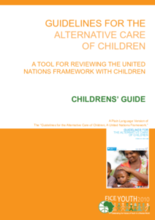This booklet from SOS Children’s Villages International was created for young people to explain in a simple manner the main points of the Guidelines for the Alternative Care of Children approved by the United Nations General Assembly in 2009. The booklet helps its young audience think about the principles of alternative care and what these mean for children and families in different situations. By recommending and instructing actions children and youth can take under each principle, the booklet encourages its audience to advocate for adequate care and protection for children at risk of being separated from their parents.
The booklet further outlines the purpose of the Guidelines while also emphasizing the need for governments to budget for children’s rights, ensuring that people and programs are employed to implement the Guidelines. The role of government in ensuring the alternative care and protection of children is particularly emphasized throughout the booklet. Moreover, it highlights the point that family is seen as the best place for growth, well-being, and protection of children, and that poverty should never be a reason for a family’s separation.
In the case that families are being separated, the government must put in place welfare and protection policies designed to improve the alternative care provision of children while also taking into consideration the opinions of the child and its caregivers in the decision making process for care arrangements. For children displaced from their home country, governments need to ensure that specific standards are met in the selection of caregivers and the quality of care and follow-up, as well as supervision and monitoring of the placement. For children in emergency situations, authorities are strongly encouraged to follows the Guidelines to prevent children from being separated from their parents and assist families in tracing and reintegration efforts.
Parental support mechanisms are suggested along with ways to addresses care issues for children of varying needs (children affected by HIV/AIDS, children with disability, children with other special needs, etc.). Touching upon the two main principles of the Guidelines (necessity and appropriateness), the booklet defines informal and formal alternative cares and suggests ways in which families, civil societies, and governments can ensure the right kind of care, quality care for children, while also emphasizing the importance of family reunification and ways to go about it when possible.

